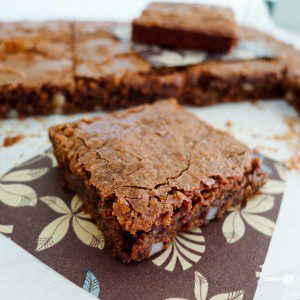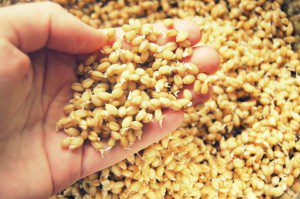Contributing Writer for Wake Up World
We are in a “baking” season! But so many people these days have problems with grain consumption. Gluten sensitivities, obesity and celiac disease are on the rise and directly related to grain consumption, especially processed grain. Sensitivities became so severe in some people that they can’t even tolerate soaps containing gluten on their bodies.
All kind of high protein, no-grain diets advise against grain consumption based on various health theories, one being that grains are a pretty new food and our digestive system didn’t evolve in order to process it, hence all the health problems.
[pro_ad_display_adzone id=”110028″]
High carb diets believers on the other hand argue that a low carb diet can be really hard on your hormones, especially on your thyroid, so it’s to be avoided.
But to understand what humans need nutritionally you must understand the environment in which our development occurred. By looking at well-established scientific laws and theories of the science of anthropology, the only conclusion to the question of human nutrition is that there is far too much genetic diversity in the human species to logically argue for any type of one-size-fits all nutrition plan that will make every person that follows it healthy.(1)
Over thirty years of research and clinical study in metabolic individuality helped us understand today that if we have genes like the Eskimo, then starchy foods like grains will contribute to degenerative diseases. But if our genes are like the indigenous Swiss, then grains are not bad for us and we can thrive on them. If we have genes like the high carb eating Quechuas who consume 80% carbs primarily from potatoes, wheat, corn, quinoa, barley, then omitting grains and eating like the Eskimo will be devastating.
As you see, one “grain” doesn’t fit all! And, it’s these differences that gave rise to differences in genetically-based requirements for foods, biochemical/metabolic individuality, or what we have classified and refer to as Metabolic Types ®.
The Problems With Grains Today: Processed and Altered
The sad reality is that people have become accustomed to the mass-produced, gooey, devitalized, and nutritionally deficient breads and baked goods that are sold today in stores and they have little recollection of how real bread should taste. Chemical preservatives allow bread to be shipped long distances and to remain on the shelf for many days without spoiling and without refrigeration.
“Depletion of the soil through the use of chemical fertilizers, pesticides and other chemicals, high-heat milling, refining and improper preparation, such as extrusion” generate a wide range of disorders and a poor state of general health in modernized people. (2)
Safe and Healthy Ways To Consume Grains
Considering our modern clinical reality, I have now a set of general rules that I recommend to be followed, in order to minimize negative effects of grain consumption and still enjoy the benefits:
1. Learn about and experiment with ancient grains like: quinoa, amaranth, spelt, kamut, teff, buckwheat, millet. These haven’t undergone the “insult” that other grains like wheat have, as far as processing and manipulation. Choose organic and sprouted varieties.
2. If you suspect you have negative reactions to gluten, and you can’t test to know for sure, it’s better to avoid it completely. Most of the times you will do a benefit to your body.
3. If you want to still use wheat, ideally, you should buy organic whole wheat berries and grind them fresh to make homemade breads and other baked goods. The second best option is to buy organic 100 percent stone-ground whole-wheat flour at a natural food store.
4. If you do not make your own bread, there are ready made alternatives available. Look for organic sourdough or sprouted breads freshly baked or in the freezer compartment of your market or health food store.
 5. Sprouting, soaking and genuine sourdough leavening “pre-digests” grains, allowing the nutrients to be more easily assimilated and metabolized. This is an age-old approach practiced in most traditional cultures. Sprouting begins germination, which increases the enzymatic activity in foods and inactivates substances called enzyme inhibitors.
5. Sprouting, soaking and genuine sourdough leavening “pre-digests” grains, allowing the nutrients to be more easily assimilated and metabolized. This is an age-old approach practiced in most traditional cultures. Sprouting begins germination, which increases the enzymatic activity in foods and inactivates substances called enzyme inhibitors.
Soaking neutralizes phytic acid, a component of plant fiber found in the bran and hulls of grains, legumes, nuts, and seeds that reduces mineral absorption.
All of these benefits may explain why sprouted foods are less likely to produce allergic reactions in those who are sensitive.
Brownie Recipe With Sprouted Flour
Brownies are a great treat for many! For cake-like brownies use sprouted flour like wheat or spelt. For denser, chewy brownies try sprouted rye or brown rice flour.
INGREDIENTS:
3 cups sprouted flour
2 cups organic buttermilk (can substitute coconut milk, water, yogurt or kefir)
12 Tbsp pastured / organic butter, softened
1 1/2 cups organic sucanat (can substitute rapadura, date or coconut sugar )
4 pastured eggs, lightly beaten
1 Tbsp vanilla
1 Tbsp chocolate extract (optional)
1 Tbsp aluminum free baking powder
1 tsp sea salt
3/4 cup organic cocoa powder (can substitute carob powder)
Crispy pecans or walnuts, chopped
Place softened butter and sucanat in large bowl and cream. Add eggs, vanilla and chocolate extract. Blend well. Mix flour, baking powder, salt and cocoa powder in a separate bowl and mix well. Add dry ingredients and buttermilk alternately to creamed mixture, beginning and ending with dry ingredients. Blend well. Spoon batter into a 9 / 13 Pyrex dish that has been buttered and floured. Sprinkle top generously with chopped nuts. Bake in a 350 degree oven for about an hour or until toothpick comes out clean.
Enjoy!
Resources:
1. Rold, Daniel. Anthropology’s Insight into Health and Human Nutrition
2. Allbritton, Jen. Wheaty Indiscretions: What Happens to Wheat, from Seed to Storage – Weston A Price Foundation
3. Wolcott, William. The Healthexcel System of Metabolic Typing
4. Recipe source: To Your Health Sprouted Flour Co.
Recommended articles by Raluca Schachter:
- Vitamin D Supplementation: This is Why It Can Be Wrong
- Hypothyroidism or Hashimoto’s? What You Need to Know and Why It Matters
- Understanding Cannabis Oil
- 6 Steps to Solve Your Blood Sugar Problems Permanently
- Antibiotic Resistant Infections: The Dangers… and How You Can Avoid Them
- What Really Happens When You Take Antibiotics?
- Understanding Inflammation and How to Eliminate It Naturally
- Listen to Your Body. Correct Food Ratios. Reverse Disease.
- Cholesterol Myths Debunked
- Follow The Money In “Sick-Care”: What’s Behind The Drugs And Needles?
- What Happens In Your Body When You Suffer From Thyroid Disease?
About the author:
 Raluca Schachter is a dedicated Clinical Nutritionist / Natural Health Practitioner a.k.a “The Health Detective”. Raluca was able to naturally reverse chronic health conditions she was struggling with most of her life, and now uses her knowledge to help as many people as possible do the same. Her health programs and diet plans offer a very unique and comprehensive approach to health, where individual nutritional and biochemical requirements are firstly met using specific nutrients and foods that each metabolism thrives on. Raluca offers her services to international clientele and her practice is fully online based. You can connect with Raluca at www.metabolicenergy.net and https://www.facebook.com/raluca.schachter.metabolicenergy
Raluca Schachter is a dedicated Clinical Nutritionist / Natural Health Practitioner a.k.a “The Health Detective”. Raluca was able to naturally reverse chronic health conditions she was struggling with most of her life, and now uses her knowledge to help as many people as possible do the same. Her health programs and diet plans offer a very unique and comprehensive approach to health, where individual nutritional and biochemical requirements are firstly met using specific nutrients and foods that each metabolism thrives on. Raluca offers her services to international clientele and her practice is fully online based. You can connect with Raluca at www.metabolicenergy.net and https://www.facebook.com/raluca.schachter.metabolicenergy
[pro_ad_display_adzone id=”110027″]







